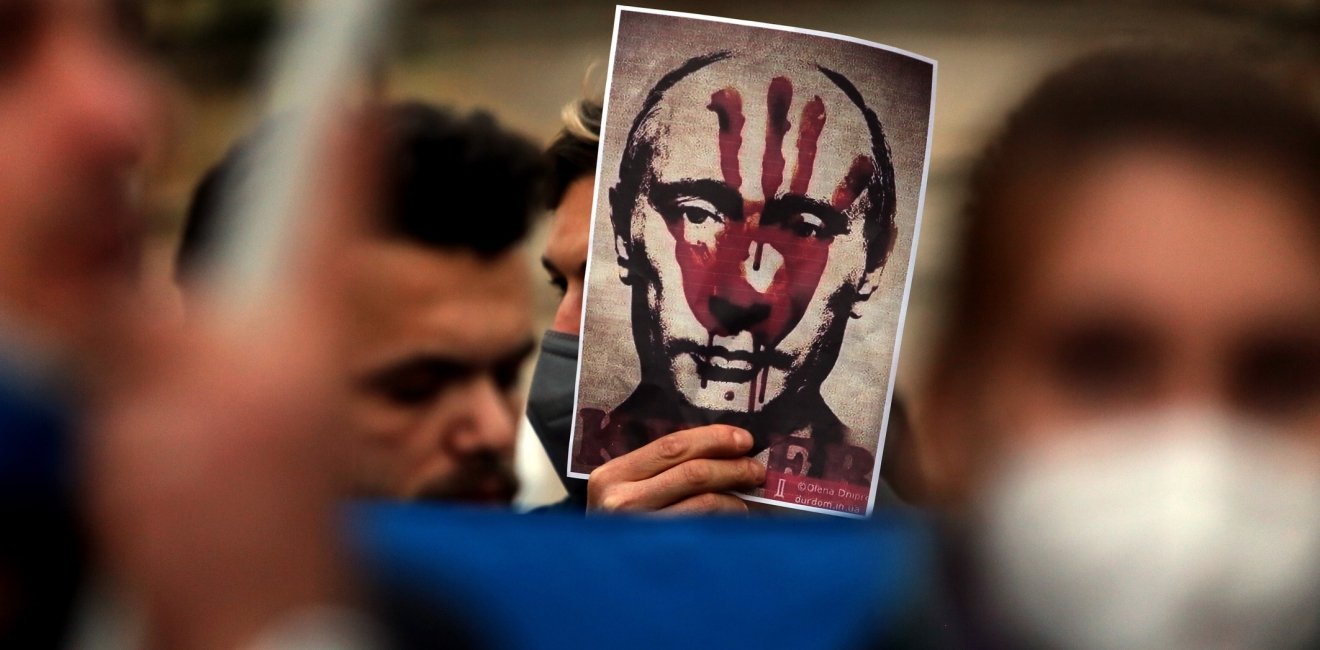
A blog of the Kennan Institute
BY VADYM DENYSENKO AND ANDRIAN PROKIP
Since Russia unleashed a full-scale war against Ukraine, Western countries have responded with a wide range of sanctions to contain Russia’s bellicosity. Consequently, many in Ukraine and abroad became hopeful about a quick fall of Putin’s regime. This hope, to some extent, is grounded in the history of the dissolution of the USSR: snowballing domestic problems conceivably could force Moscow to pay attention to deepening internal problems instead of devoting treasure and personnel to a belligerent foreign policy, ultimately resulting in regime failure. But how likely is it that Russia’s current problems will lead to a swift demise of the regime? Are we not, instead, looking at a scenario of a slower downfall rather than rapid collapse—and if so, how might the latter inform our actions?
In general, an autocratic regime is founded on the following pillars: economic stability; a monolithic political power structure; people’s trust in or fear of the authority, crafted and enforced through propaganda; and a repression mechanism.
Some of those pillars in Russia today seem less sturdy than before, chiefly as a result of the sanctions. Sanctions impact first and foremost on a country’s economic situation and the welfare of households, and a worsened economic situation means lower satisfaction with the government. Russia’s debt in a pre-default status, the prospect of a further weakening of the ruble, the freezing of Russia’s reserves in other countries, and an expected decline in household income are the immediate consequences of the current round of sanctions. It is too early to say anything about the effects of the economic policy responses to the sanctions (including massive money printing to support the economy), but they might accelerate a collapse of the regime.
However, the size of the Russian economy and Russia’s share in some global markets such as energy reduce the effectiveness and immediate impact of aggressive sanctions in restricting the country’s capabilities, even though their full force may, in fact, be felt in the future, much as a drop in oil prices added to the self-destruction of the USSR.
The start of the sanctions on Russian energy exports has affected the economy. But owing to Russia’s oversized role in the energy markets, other countries will need time to find a substitute for those supplies, which means that the ultimate economic results of the sanctions won’t be known for a while. Moreover, Russian energy companies have long-term export contracts, which means guaranteed revenues. This means that the economic situation in Russia will depend in part on the willingness of countries that have been slower in imposing sanctions to cooperate with it. Some of these countries will be lining up to buy Russian energy at discounted prices, as India said it intended to do.
How the global players will align themselves in imposing energy sanctions on Russia is a puzzle that is yet to be solved. Energy exporters—the United States, Canada, the Persian Gulf states, probably even Iran and Venezuela—may benefit from the situation. But energy-dependent states such as China and India may continue to buy Russian energy, indirectly supporting the regime. The extra-high energy prices that the world faces will also serve partially to compensate Russia for the reduced volumes of its energy exports. All these factors may prolong the life of Putin’s regime.
Wage levels and quality of life are important factors but not the only ones defining a people’s attitude toward ruling elites, especially in a society with a Goebbels-strength propaganda machine and a controlled information environment. A similar control of information and propagation of disinformation were characteristic of the USSR. The Russian government further enhances its propaganda efforts by prohibiting Western social media such as Facebook, Twitter and Instagram as a way to filter the information that Russians can access.
Of course, there are ways for ordinary Russians to comprehend the depth and scale of the government’s lies. Even as authorities report “military successes” in Ukraine, thousands of dead or injured Russian soldiers have returned from the front. Some of those who are alive have shared their impressions and experiences, painting a vastly different picture from the one promulgated by official propaganda. But ordinary Russian citizens are still in a very early stage of realizing the magnitude of the elites’ totalizing lies. The potential for protest is very low in the country and alternative political forces that might compete with the ruling elites have been suppressed, even at the local level.
With the widespread blindness of the populace with respect to the actions of the Russian ruling elites, a blackout on real information, and the fear of consequences of dissent, the political system remains strong: Putin has learned from the late-Soviet experience that any weakening of a repressive stance, any letting up on the propaganda machine, spells the end of an autocracy. Even widespread corruption among elites and the leaking of information about it cannot shatter that power. The absence of powerful alternative regional elites to take up the reins of governance puts paid in advance to any notions of dismantling Putin’s regime. And trust in Vladimir Putin personally remains high in all the regions.
In sum, there is no good reason to hope for a quick demise of Putin’s regime. Mass protests due to economic issues and a worsening quality of life are slow to develop and have an impact. And the Russian repression machine is strong and ready to cope with protests. Hence the West’s sanctions are unlikely to result in protests sufficient to bring about the fall of Putin’s regime any time soon. With the local elites consolidating around Putin, the chance of a coup is also weak and is diminished further by Putin’s readiness to tamp down any disloyalty he suspects in his circle of advisers.
Undermining the political regime is a very important step toward containing Russia’s bellicosity in the long term. But in the short and intermediate term, the regime will take additional steps—military, political, economic—to save itself: it will attempt to negotiate with some countries that did not impose sanctions, to notch some political victories and put a floor under the declining economic situation. To cope with these moves, Ukraine needs more military equipment and all kinds of international aid and support, including a tightening of the economic and political pressure applied to Russia by Ukraine’s allies—such as by pursuing a consistent policy on restricting Russian energy exports—and unwavering unity on the part of Ukrainians.
The opinions expressed in this article are those solely of the authors and do not reflect the views of the Kennan Institute.
Authors


Director, Energy Program, Ukrainian Institute for the Future

Kennan Institute
After more than 50 years as a vital part of the Wilson Center legacy, the Kennan Institute has become an independent think tank. You can find the current website for the Kennan Institute at kennaninstitute.org. Please look for future announcements about partnership activities between the Wilson Center and the Kennan Institute at Wilson Center Press Room. The Wilson Center is proud of its historic connection to the Kennan Institute and looks forward to supporting its activities as an independent center of knowledge. The Kennan Institute is committed to improving American understanding of Russia, Ukraine, Central Asia, the South Caucasus, and the surrounding region through research and exchange. Read more

Explore More in Focus Ukraine
Browse Focus Ukraine
Talking to the Dead to Heal the Living

Ukrainian Issue in Polish Elections


